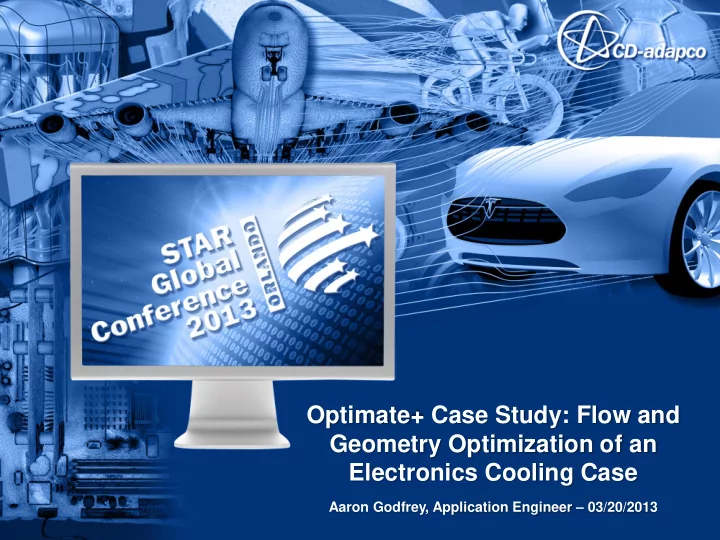

Optimate+ Case Study: Flow and Geometry Optimization of an Electronics Cooling Case Aaron Godfrey, Application Engineer – 03/20/2013
Outline Problem Description Geometry Parameterization Mesh Settings Results
Problem Statement – Electronics Cooling Optimization Electronics equipment cooling (representative of customer projects) Each Ball Grid Array (BGA) to be fitted with one aluminum heat sink Maximum temperature on BGA BGA’s chips of 85 C Minimize heat sink mass
Terminology Optimate+ = STAR-CCM+ add-on available through user portal – Creates all necessary scripting – Submits and monitors jobs – Collects the simulation data – Post-process the study HEEDS = Software developed by our partner Red Cedar Technology that Optimate+ couples with – Allows access to DOE, optimization, and post-processing capability SHERPA = Adaptive global/local optimization algorithm from Red Cedar Technology
Geometry Parameterization – Casing Casing CAD parameterization – Exhaust Translation
Geometry Parameterization – Heat Sinks Heat sink CAD parameterization – Pin Height – Ellipse Major Radius – Ellipse Minor Radius – X Fill Percentage – Y Fill Percentage – Radii Ratio
Pipeline Mesh Operations – New in 8.02
Mesh Polyhedral mesh with body fitted prism layers on all solid/fluid interfaces Conformal interfaces between all solid/solid, solid/fluid, and fluid/fluid contacts Mesh sizes ranged from 1.5M cells to 9M cells – this is entirely a function of heat sink design
Optimate+ Project Settings Optimization algorithm: SHERPA Objective Function: Min DeltaT, Min Mass with 3:1 weighting 183 Designs with 8 parallel runs on 8 cores each – 64 cores for 4 days
Results – Design Iterations
Results – Objective and Performance History
Results – Top 40 Designs
Results – Parallel Plots
Results – Parallel Plots 100 Best Designs All Designs 50 Best Designs 25 Best Designs
Results – Optimum Design SHERPA identified Optimum: – Exhaust Translation near minimum – Ellipse Major Radius at maximum – Ellipse Minor Radius at minimum – X Fill Percentage at maximum with some spread (expected) – Y Fill Percentage at minimum – Pin height at maximum – Radii Ratio towards maximum with significant spread
Results – Temperature Isosurface
Results – Boundary Heat Flux
Results – Line Integral Convolution
Results – Line Integral Convolution
Results – Streamlines
Possible Alternative Analysis Complete multi-objective optimization using MO- SHERPA would allow for full resolution of Pareto front between two objectives Additional analysis of any of the three local optima found by SHERPA using the DOE capability inside Optimate+ could give more insight into trends and relationships Expanding design space where possible for parameters where the optimum value was at the min or max allowed
Recognition Ruben Bons – CD-adapco, Electronics Sector Manager Mike Dombroski – CD-adapco, Application Engineer and Developer of Optimate(+) Matt Janeway – CD-adapco, Application Engineer Marcus Rademacher – Red Cedar Technology, Sr. Engineering Analyst
Questions?
Recommend
More recommend